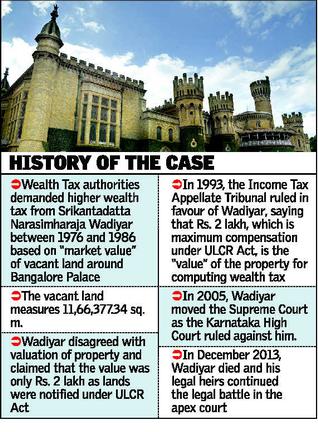Issue was valuation of vacant land around Bangalore Palace
Nearly two years after his death, the then scion of the Mysore royal family Srikantadatta Narasimharaja Wadiyar has finally won the legal battle, which lasted 38 years, over the valuation of vacant lands around the Bangalore Palace for the assessment of wealth tax between 1977 and 1986.
The Supreme Court, in its September 21 verdict, held that total market value of the vacant land, which came under the Urban Land (Ceiling and Regulation) Act, 1976 will have to be considered as Rs. 2 lakh, which was the maximum compensation payable while taking over the land under the ULCR Act, for computation of wealth tax. The tax authorities had assumed the value of the land in the range between Rs. 13 crore and Rs. 31 crore during the period (between 1977 and 1986) for calculating the wealth tax.
The Supreme Court did not agree with the claim of the tax authorities and the Karnataka High Court’s 2005 finding that value of the vacant land had to be estimated to be the price, which in the opinion of the wealth tax officer, the land would fetch if sold, hypothetically, in the open market on the valuation date even though the land was notified under the ULCR Act during the assessment period.
There was no dispute with regard to valuation of residential, non-residential structures and appurtenant land thereto as Wadiyar had paid the wealth tax accepting the valuation for them. The dispute was only with regard valuation of vacant land that was notified under the ULCR Act.
A Bench, comprising Justice A.K. Sikri and Justice Rohinton Fali Nariman, wondered how one could assume the hypothetical sale for the valuation purpose when the land was under the clutches of the ULCR Act and the authorities had already determined the maximum compensation of Rs. 2 lakh for the entire land.
‘Ordinary way’
Stating that it was not oblivious of those buyers who purchased “disputed properties” for higher rates by taking risks, the apex court said it had to consider only “ordinary way” of the presumptuous sale and conduct of a reasonable person, who would not offer more than Rs. 2 lakh when knowing well about the compensation.
source: http://www.thehindu.com / The Hindu / Home> News> Cities> Bengaluru / by KrishnaPrasad / Bengaluru – September 26th, 2015
